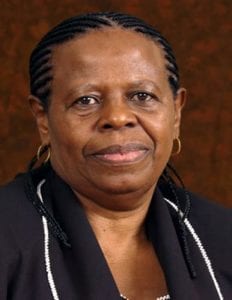The deputy minister of Water and Environmental Affairs, Rejoice Mabudafhasi, embarks on Sandspruit River clean-up in Senekal, Free State.
“One of our biggest challenges in the water sector is high levels of pollution in our rivers nationally, which are the sources of water. If we do not address this challenge we will not achieve our development goals,” said Mabudafhasi when she recently embarked on the river clean-up as part of the Adopt-a-River project. “The department cannot address this challenge alone. We need communities to come on board and participate actively in the management of water resources and environment. They are the ones closer to these rivers and we believe their indigenous knowledge can be useful in changing the status quo,” said Mabudafhasi. Adopt-a-River was initiated by the Department of Water Affairs in the hopes of encouraging communities and other stakeholders to take charge of the river systems in their area. It forms one of the projects of the River Health Programme, a nationwide monitoring system assessing the health of South Africa’s rivers.The Sandspruit River is a small tributary of the Sand River that runs past the Matwabeng township. The pollution of the river by a number of sources was identified by the Setsoto Women Empowerment Group, which has subsequently adopted it. While the original team was only 30 women in the Ficksburg area, it has subsequently grown to 164 people from a number of surrounding communities, including Ficksburg, Senekal, Clocolan and Marquard. The project is a completely voluntary initiative.
“It is targeting women specifically as we strive for socio-economic empowerment of women in their communities,” explained Mabudafhasi, adding that empowerment of women is one of the smartest investments any country can make towards its development. “We believe that sustainable water resources management will be achieved by full participation of women.” So far, the women have acquired skills in solid waste management, occupational health and safety, identification of alien weeds and herbicide application, water safety, snake handling, first aid, environmental education and life skills. “The department will engage the private sector and donors in negotiating funding of this project as we would like to see it grow bigger and we also wish that that these women can become involved in economic activities. Training will commence early next year,” concluded Mabudafhasi. To date, the Adopt-a-River project has created 1 000 job opportunities nationally.






